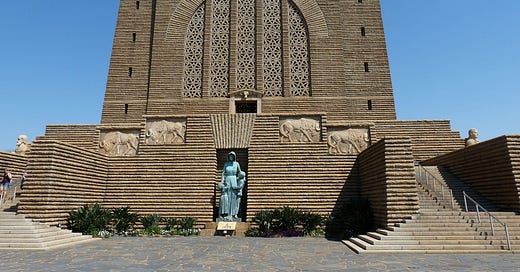The story of Afrikaner empowerment is more complex than Khwezi Mabasa might think
Afrikaner empowerment was a complex interplay of state power and communal self-determination, alongside an unfortunate dimension of authoritarianism.
Written by: Ayanda Sakhile Zulu
Khwezi Mabasa offers a provocative reading of Afrikaner history, but one that reduces a deeply layered story to a single and convenient narrative. His central argument is that Afrikaner empowerment was almost entirely driven by the state through racially exclusive interventions such as job reservation, welfare programmes, and state-owned enterprises. In his framing, this history justifies a contemporary equivalent: If the Apartheid state empowered poor whites, then the democratic state must empower poor blacks. Those who oppose this logic, particularly Afrikaners, are dismissed as either hypocrites or historical revisionists.
But this reading is overly simplistic. Afrikaner empowerment wasn’t only a top-down state project. It was also the result of grassroots efforts, community mobilisation, and institutional self-reliance. These efforts were critical in shaping the socio-economic landscape and paving the way for later state intervention.
Afrikaner communities had organised themselves long before the state played a role. The Helpmekaar Movement is a good example. Through mutual support, Afrikaners pooled resources to assist one another. This culture of collective support laid the groundwork for future empowerment and helped to establish the social cohesion that was needed for state aid to be effective.
Simultaneously, businesses like Sanlam and Volkskas were emerging. These were not passive recipients of state aid as they had established themselves through community-driven efforts. Sanlam, as a case study, was founded in the early 20th century to address Afrikaner economic needs. It grew from mutual self-help, and state support later enhanced its established role.
Mabasa’s interpretation misses this aspect entirely. By presenting Afrikaner empowerment as purely state-driven, he oversimplifies the past. His version serves a political purpose: to justify state-led, race-based redress today by drawing a direct line from Apartheid-era interventions to doomed efforts such as Broad-Based Black Economic Empowerment (B-BBEE), land expropriation, and employment equity. If the state empowered whites through racial policies, he suggests, it must now empower blacks in the same way.
This analogy, however, cannot hold. The Apartheid state was not just an economic agent but also a repressive regime. Its policies of racial segregation and exclusion had long-lasting effects on the country’s economy and society. While Afrikaners may have benefited economically, these benefits were intertwined with the broader project of racial domination. State policies such as job reservation weren’t simply about uplifting Afrikaners but they also reinforced the subjugation of black people and entrenched a racially divided economy. By 1989, state-owned enterprises were costing billions of rands in subsidies and highlight the inefficiency of a system built on political patronage rather than market-based merit.
A 1990 report from the Development Bank of Southern Africa further underscored these inefficiencies. Apartheid-era policies distorted markets and misallocated resources, with state entities like Eskom frequently criticised for mismanagement. Rather than driving economic success, these institutions became vehicles for political loyalty and undermined both competence and competition.
Furthermore, Mabasa’s framework risks perpetuating a culture of dependency. By focusing solely on state-driven empowerment, it downplays the importance of community agency, entrepreneurship, and grassroots institution-building. This view discourages black people from taking initiative by building institutions from the ground up. The Afrikaner case shows that state support was most effective when it complemented rather than replaced grassroots efforts. It was the cultural values of solidarity, thrift, and initiative that laid the foundation for empowerment long before the state became involved.
This ethic is virtually impossible to legislate, but it is essential for sustainable and truly liberating empowerment. The problem with Mabasa’s argument is that it misinterprets history while promoting a development model that has already shown its deficiencies.
History must inform our present, but with nuance and integrity. Afrikaner empowerment was a complex interplay of state power and communal self-determination, alongside an unfortunate dimension of authoritarianism. To reduce it to one or the other risks repeating the same mistakes we should have learned from.
Ignoring the worldwide experience with what truly and sustainably works without needing the social engineering aspect Apartheid relied on, is also reckless.
The evidence is in that free markets, private property, individual liberty, and limited constitutional government, are the absolute best policy avenues the state can pursue – alongside communal self-employment – to bring about prosperity and flourishing for everyone.
Ayanda Sakhile Zulu holds a BSocSci in Political Studies from the University of Pretoria and is an intern at the Free Market Foundation.




